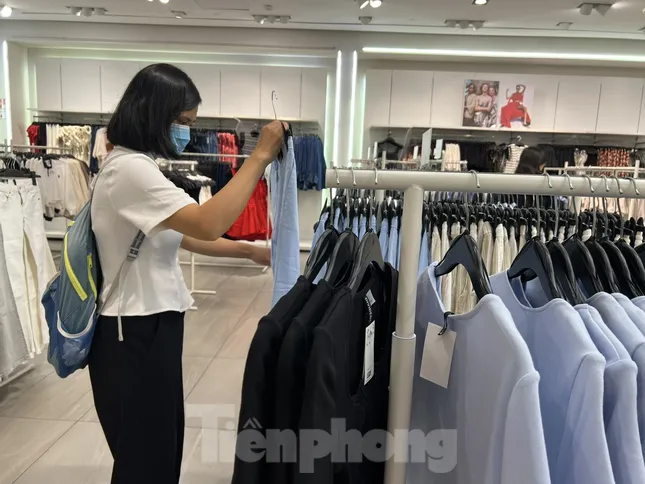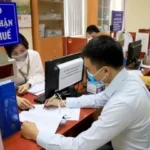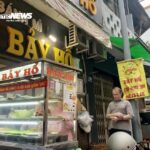Refund due to lack of cash
On June 13, Ms. An from Dak Lak shared with Tien Phong newspaper that her family had just returned from a trip to Ho Chi Minh City, combining sightseeing and shopping. Before leaving, they visited the H&M store in District 1 for some shopping. After selecting numerous items totaling over VND 12 million, Ms. An took out her phone to make a payment, but the store staff informed her that they did not accept bank transfers.
“We came from far away and didn’t carry much cash for fear of loss. Usually, I only carry my phone for bank account payments when shopping. By the time we arrived at the store, it was already late afternoon, so we couldn’t go to the bank to withdraw cash. Consequently, we had to return the goods. It was truly disappointing as we wasted time and couldn’t shop as desired,” shared Ms. An.
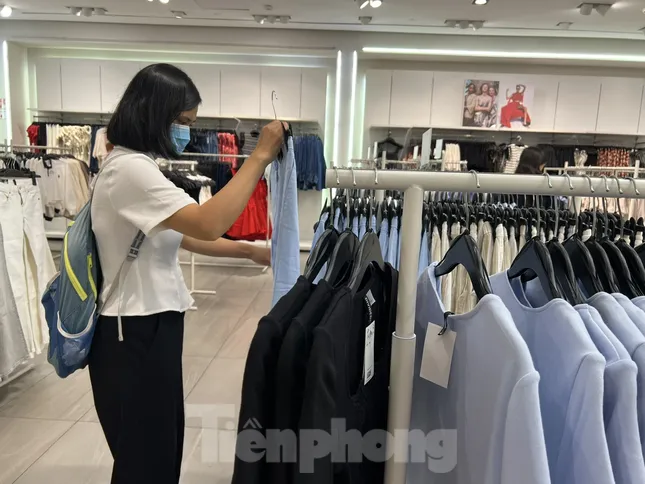
Customers shopping at H&M can only pay by cash or card via POS machine and cannot use QR code scanning or phone transfers.
Posing as a customer, Tien Phong’s reporters visited the same H&M store as Ms. An. When asked about payment methods, the staff mentioned that they only accepted cash or card payments (via POS machine) and did not allow phone transfers or QR code scanning.
“This payment method has been applied for a long time and is not new,” said the store staff.
Mr. Hung, a 45-year-old office worker, shared his frustration when he went to a jewelry store on Tan My Street (District 7) to buy a gold ring for a friend’s wedding gift. The store also required him to pay in cash and did not accept bank transfers. “I only carry a few hundred thousand dong when I go out, and now I want to buy a gold ring worth more than VND 10 million, but the store owner doesn’t allow transfers. It’s unreasonable,” said Mr. Hung.
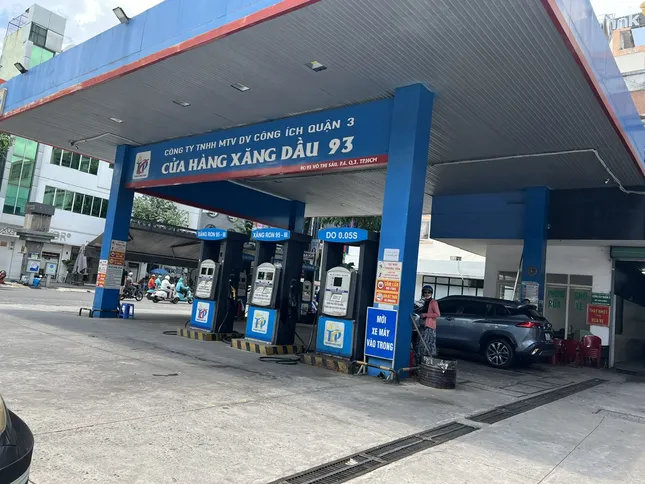
The gas station on Vo Thi Sau Street (District 3) only accepts cash and does not agree to any other form of transfer.
In a more bizarre situation, Ms. Phuong Vy from Binh Tan District ran out of gas and couldn’t refill because the gas station did not accept transfers. Gas Station No. 93 on Vo Thi Sau Street (District 3) does not accept transfers, card payments, QR code scanning, or Momo like many other gas stations.
“Usually, gas stations offer multiple payment methods, but this one only accepts cash, which is unreasonable. Nowadays, even a VND 10,000 bag of tea allows for bank transfers,” said Ms. Vy.
Evasion of tax will result in criminal liability
Mr. Nguyen Tien Dung, Deputy Chief of the Tax Office in Area II (Ho Chi Minh City), shared his thoughts on the information that some businesses refuse non-cash payment methods and even increase prices for customers who choose to pay by transfer or only accept cash. He believes that these are isolated cases and occur only in a small number of households. The reasons could be that these households are not fully aware of the government’s policies or are hesitant about their declaration and tax payment obligations.
According to Mr. Dung, although there are currently no specific penalties for refusing non-cash payments, it clearly goes against the government’s direction to promote cashless payments and build a digital economy with transparent transactions.
“I would like to emphasize that regardless of the payment method, whether by cash or transfer, businesses must issue invoices and fully comply with tax obligations under the law. The tax authority is equipped with modern tools to monitor and inspect. For example, through the electronic invoice system, the tax authority can cross-reference data between input and output, thereby detecting abnormalities such as low sales revenue or disproportionate input and output values,” Mr. Dung explained.
In the event of tax evasion, depending on the nature and severity of the violation, the offender may face administrative sanctions or criminal liability as stipulated by law. Therefore, Mr. Dung advised businesses to enhance their awareness of legal compliance and diligently fulfill their tax obligations to contribute to a fair, transparent, and sustainable business environment.
Mr. Nguyen Hoa Bac, Head of the Management Division for Household Businesses, Individuals, and Other Taxes at the Tax Office in Area II, pointed out that the concept of a “cash register” is no longer limited to a physical device. Phone applications, POS machines, and websites with sales functions are all considered cash registers. For businesses already using cash registers, integrating electronic invoice software is more straightforward.
“The tax authority is collaborating with solution providers to support household businesses in embracing technology easily. Many providers have offered free access to electronic invoice software and cash registers for 6-12 months to facilitate a smooth digital transition,” said Mr. Bac.
Regarding the misinformation that businesses must pay VND 500-1,000 per electronic invoice to the solution providers, Mr. Bac clarified that the tax authority has worked with these providers to agree on a charge of only VND 50 per invoice.
Lawyer Nguyen Duc Nghia, Deputy Director of the Small and Medium Enterprise Support Center under the Ho Chi Minh City Business Association, stated that merely refusing transfers is not sufficient to conclude that a business is hiding revenue or evading taxes. Currently, there is no regulation prohibiting consumers from using cash to pay for goods and services or forbidding individuals or enterprises from accepting cash payments. According to Lawyer Nghia, the implementation of new regulations from June 1 may have caught some businesses unprepared in terms of equipment, procedures, and mental readiness, so they may need time to adjust.
The Tax Evasion Director: A Debt of Almost $2000 Could Result in a Departure Delay
Amidst the surge in overdue tax debts, customs authorities are rigorously employing exit bans on legal representatives of delinquent businesses. These businesses, despite exhibiting signs of evasion, have accumulated tax debts amounting to merely a few million dong. This decisive action underscores the authorities’ unwavering commitment to curbing tax delinquency and safeguarding public finances.
“H&M and SYRE Aim to Make Vietnam the Global Hub for Circular Textile Manufacturing”
During their meeting with Prime Minister Pham Minh Chinh in Stockholm, the leaders of H&M and SYRE pledged to expand their green investments in Vietnam. With a proposed $1 billion recycling plant project, they aim to revolutionize the textile industry, embracing a circular economy model.
“Purchasing Goods Valued Under 20 Million VND: The Cashless Transaction Requirement”
As of July 1st, businesses purchasing goods who wish to claim input Value-Added Tax (VAT) deductions must possess non-cash payment transaction documents.

